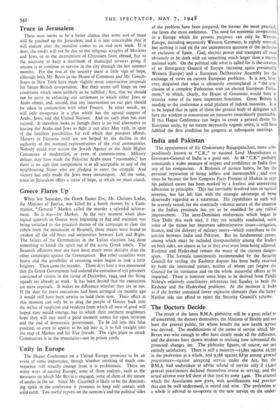Unity in Europe
The Hague Conference on a United Europe promises to be an event of some importance, though whether anything of much con- sequence will actually emerge from it is problematic. There are many ways of uniting Europe, some of them realistic, such as the measures on which Mr. Bevin is engaged, some of them of the nature of castles in the air. Since Mr. Churthill is likely to be the dominat, ing spirit at the conference it promises to keep safe contact with solid earth. Two useful reports on the economic and the political sides
of the problem have been prepared, the former the more practical, the latter the more ambitious. The need for economic co-operation in a Europe which for present purposes can only be Western1 Europe, including necessarily Western Germany, is rightly stressed, but nothing is said on the not unimportant question of the inclusion or exclusion of Spain. Coal, electric power and transport all need obviously to be dealt with on something much larger than a merely national scale. On the political side what is called for is the creation of an Emergency Council of Europe (meaning again presumably Western Europe) and a European Deliberative Assembly for the exchange of views on current European problems. It is not, how- ever, disguised that what is ultimately contemplated is "the con- clusion of a complete Federation with an elected European Parlia- ment," to which, clearly, the House of Commons would have to transfer some of its most important functions. Great Britain is sending to the conference a solid phalanx of federal unionists. It is to be hoped that in spite of them the general body of delegates will have the wisdom to concentrate on measures immediately practicable. If this Hague Conference can begin to create a general desire for European unity, by no means necessarily organic unity, it will have fulfilled the first condition for progress at subsequent meetings.


































 Previous page
Previous page